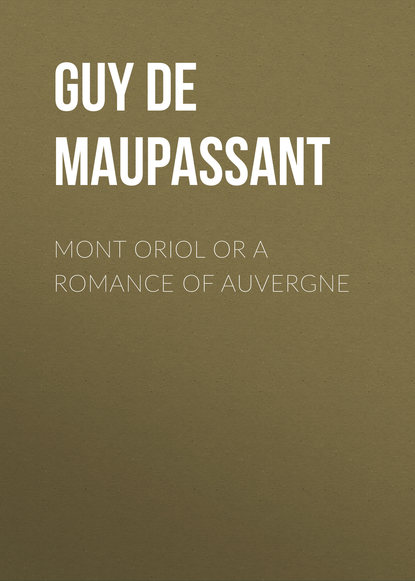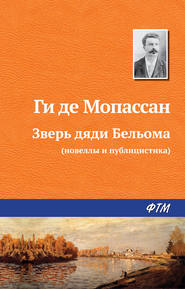По всем вопросам обращайтесь на: info@litportal.ru
(©) 2003-2024.
✖
Mont Oriol or A Romance of Auvergne
Настройки чтения
Размер шрифта
Высота строк
Поля
She stood erect; he rose up, caught her in his arms, and embraced her passionately.
A sudden noise parted them; Père Oriol had just come in, and he was gazing at them, quite scared. Then, he cried: "Ah! bougrrre! ah! bougrrre! ah! bougrrre of a savage!"
Charlotte had rushed out, and the two men remained face to face. After some seconds of agitation, Paul made an attempt to explain his position.
"My God! Monsieur – I have conducted myself – it is true – like a – "
But the old man would not listen to him. Anger, furious anger, had taken possession of him, and he advanced toward Bretigny, with clenched fists, repeating:
"Ah! bougrrre of a savage – "
Then, when they were nose to nose, he seized Paul by the collar with his knotted peasant's hands.
But the other, as tall, and strong with that superior strength acquired by the practice of athletics, freed himself with a single push from the countryman's grip, and, pushing him up against the wall:
"Listen, Père Oriol, this is not a matter for us to fight about, but to settle quietly. It is true, I was embracing your daughter. I swear to you that this is the first time – and I swear to you, too, that I desire to marry her."
The old man, whose physical excitement had subsided under the assault of his adversary, but whose anger had not yet been calmed, stuttered:
"Ha! that's how it is! You want to steal my daughter; you want my money. Bougrrre of a deceiver!"
Thereupon, he allowed all that was on his mind to escape from him in a heap of grumbling words. He found no consolation for the dowry promised with his elder girl, for his vinelands going into the hands of these Parisians. He now had his suspicions as to Gontran's want of money, Andermatt's craft, and, without forgetting the unexpected fortune which the banker brought him, he vented his bile and his secret rancor against those mischievous people who did not let him sleep any longer in peace.
One would have thought that his family and his friends were coming every night to plunder him, to rob him of everything, his lands, his springs, and his daughters. And he cast these reproaches into Paul's face, accusing him also of wanting to get hold of his property, of being a rogue, and of taking Charlotte in order to have his lands.
The other, soon losing all patience, shouted under his very nose: "Why, I am richer than you, you infernally currish old donkey. I would bring you money."
The old man listened in silence to these words, incredulous but vigilant, and then, in a milder tone, he renewed his complaints.
Paul then answered him and entered into explanations; and, believing that an obligation was imposed on him, owing to the circumstances under which he had been surprised, and for which he was solely responsible, he proposed to marry the girl without asking for any dowry.
Père Oriol shook his head and his ears, heard Paul reiterating his statements, but was unable to understand. To him this young man seemed still a pauper, a penniless wretch.
And, when Bretigny, exasperated, yelled, in his teeth: "Why, you old rascal, I have an income of more than a hundred and twenty thousand francs a year – do you understand? – three millions," the other suddenly asked: "Will you write that down on a piece of paper?"
"Yes, I will write it down!"
"And you'll sign it?"
"Yes, I will sign it."
"On a sheet of notary's paper?"
"Yes, certainly – on a sheet of notary's paper!"
Thereupon, he rose up, opened a press, took out of it two leaves marked with the Government stamp, and, seeking for the undertaking which Andermatt, a few days before, had required from him, he drew up an odd promise of marriage, in which it was made a condition that the fiancé vouched for his being worth three millions; and, at the end of it Bretigny affixed his signature.
When Paul found himself in the open air once more, he felt as if the earth no longer turned round in the same way. So then, he was engaged, in spite of himself, in spite of her, by one of those accidents, by one of those tricks of circumstance, which shut out from you every point of escape. He muttered: "What madness!" Then he reflected: "Bah! I could not have found better perhaps in all the world!"
And in his secret heart he rejoiced at this snare of destiny.
CHAPTER XIV.
Christiane's Via Crucis
The dawn of the following day brought bad news to Andermatt. He learned on his arrival at the bath-establishment that M. Aubry-Pasteur had died during the night from an attack of apoplexy at the Hotel Splendid.
In addition to the fact that the deceased was very useful to him on account of his vast scientific attainments, disinterested zeal, and attachment to the Mont Oriol station, which, in some measure, he looked upon as a daughter, it was much to be regretted that a patient who had come there to fight against a tendency toward congestion should have died exactly in this fashion, in the midst of his treatment, in the very height of the season, at the very moment when the rising spa was beginning to prove a success.
The banker, exceedingly annoyed, walked up and down in the study of the absent inspector, thinking of some device whereby this misfortune might be attributed to some other cause, such as an accident, a fall, a want of prudence, the rupture of an artery; and he impatiently awaited Doctor Latonne's arrival in order that the decease might be ingeniously certified without awakening any suspicion as to the initial cause of the fatality.
All at once, the medical inspector appeared on the scene, his face pale and indicative of extreme agitation; and, as soon as he had passed through the door, he asked: "Have you heard the lamentable news?"
"Yes, the death of M. Aubry-Pasteur."
"No, no, the flight of Doctor Mazelli with Professor Cloche's daughter."
Andermatt felt a shiver running along his skin.
"What? you tell me – "
"Oh! my dear manager, it is a frightful catastrophe, a crash!"
He sat down and wiped his forehead; then he related the facts as he got them from Petrus Martel, who had learned them directly through the professor's valet.
Mazelli had paid very marked attentions to the pretty red-haired widow, a coarse coquette, a wanton, whose first husband had succumbed to consumption, brought on, it was said, by excessive devotion to his matrimonial duties. But M. Cloche, having discovered the projects of the Italian physician, and not desiring this adventurer as a second son-in-law, violently turned him out of doors on surprising him kneeling at the widow's feet.
Mazelli, having been sent out by the door, soon re-entered through the window by the silken ladder of lovers. Two versions of the affair were current. According to the first, he had rendered the professor's daughter mad with love and jealousy; according to the second, he had continued to see her secretly, while pretending to be devoting his attention to another woman; and ascertaining finally through his mistress that the professor remained inflexible, he had carried her off, the same night, rendering a marriage inevitable, in consequence of this scandal.
Doctor Latonne rose up and, leaning his back against the mantelpiece, while Andermatt, astounded, continued walking up and down, he exclaimed:
"A physician, Monsieur, a physician to do such a thing! – a doctor of medicine! – what an absence of character!"
Andermatt, completely crushed, appreciated the consequences, classified them, and weighed them, as one does a sum in addition. They were: "First, the disagreeable report spreading over the neighboring spas and all the way to Paris. If, however, they went the right way about it, perhaps they could make use of this elopement as an advertisement. A fortnight's echoes well written and prominently printed in the newspapers would strongly attract attention to Mont Oriol. Secondly: Professor Cloche's departure an irreparable loss. Thirdly: The departure of the Duchess and the Duke de Ramas-Aldavarra, a second inevitable loss without possible compensation. In short, Doctor Latonne was right. It was a frightful catastrophe."
Then, the banker, turning toward the physician: "You ought to go at once to the Hotel Splendid, and draw up the certificate of the death of Aubry-Pasteur in such a way that no one could suspect it to be a case of congestion."
Doctor Latonne put on his hat; then just as he was leaving: "Ha! another rumor which is circulating! Is it true that your friend Paul Bretigny is going to marry Charlotte Oriol?"
Andermatt gave a start of astonishment.
"Bretigny? Come-now! – who told you that?"
"Why, as in the other case, Petrus Martel, who had it from Père Oriol himself."
"From Père Oriol?"
"Yes, from Père Oriol, who declared that his future son-in-law possessed a fortune of three millions."

















